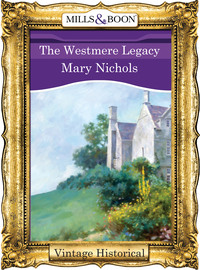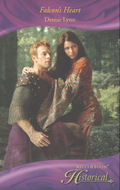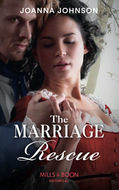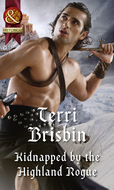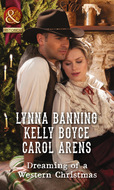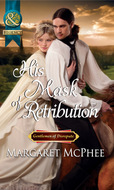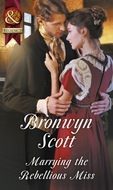Kitap dosya olarak indirilemez ancak uygulamamız üzerinden veya online olarak web sitemizden okunabilir.
Kitabı oku: «The Westmere Legacy»
“I shall go mad if I have to stay here a day longer,” Bella cried.
“Then you shan’t.” Robert took a letter from his pocket and handed it to her. “I believe this is an invitation to spend some time with Mama. She has sent me with the coach to fetch you.”
“Oh, Robert, you are an angel!” She flung her arms about his neck and kissed him joyously on each check, as a child might have done. He raised his hands halfway to his shoulders and then, not knowing what to do with them, dropped them again and stood stiffly to attention.
Suddenly aware of his lack of response, she stood back, her face scarlet. “Oh, I am sorry….”
He smiled and stroked her cheek with the back of one finger. “Impulsive as always, my dear, but you must remember that we are no longer childhood playmates. Society is likely to be shocked by such forwardness.”
The Westmere Legacy
Mary Nichols

MILLS & BOON
Before you start reading, why not sign up?
Thank you for downloading this Mills & Boon book. If you want to hear about exclusive discounts, special offers and competitions, sign up to our email newsletter today!
Or simply visit
Mills & Boon emails are completely free to receive and you can unsubscribe at any time via the link in any email we send you.
MARY NICHOLS
Born in Singapore, Mary Nichols came to England when she was three, and has spent most of her life in different parts of East Anglia. She has been a radiographer, school secretary, information officer and industrial editor, as well as a writer. She has three grown children and four grandchildren.
Contents
Cover
Title Page
About the Author
Chapter One
Chapter Two
Chapter Three
Chapter Four
Chapter Five
Chapter Six
Chapter Seven
Chapter Eight
Chapter Nine
Chapter Ten
Chapter Eleven
Historical Note
Copyright
Chapter One
March 1816
‘Sylvester!’ William Huntley, second Earl of Westmere, could be heard bellowing as far away as the kitchens, where Bella was speaking to Cook about the day’s menus. ‘Sylvester! Damn your eyes, man! I want you here.’
‘Oh, dear, his gout must be plaguing him again,’ Bella said. ‘Where can Sylvester be?’
There was the sound of hurrying footsteps on the landing above them and then silence. A few minutes later a tall gangly individual in a suit of black clothes and thinning hair of indeterminate colour appeared in the doorway with a large jug which he handed to Daisy, the kitchen maid, to fill with hot water. ‘He is determined on dressing and coming downstairs,’ he said.
‘But he hasn’t had his breakfast.’
‘He says he will have it in the breakfast parlour in half an hour.’
‘Oh, lor,’ Daisy said, filling the jug with hot water from a huge kettle on the stove and giving it back to him. ‘There’s no fire in there.’
‘Then you’d better put one there quick sharp.’
‘And who’s going to help me cook breakfast if the girl disappears, making fires?’ Cook demanded. ‘Can’t you persuade him to have his breakfast in his room like he always does? I can’t think why he should suddenly decide to come downstairs for it—it’s years since he did that.’
‘He says he’s made a decision and he’s going to set it in train today.’
‘Oh, and what might that be?’
The valet shrugged his bony shoulders. ‘How should I know?’
‘You’re privy to most things where he’s concerned. I’ll wager he’s told you.’
‘He has not and if he had, I wouldn’t tell you, madam. I’m off before he starts yelling again.’
‘Gout he might have, but it hasn’t affected his voice,’ Cook said, as they heard his lordship shouting again.
‘No, but it does give him a great deal of pain,’ Bella put in mildly, as the valet scuttled from the room with the hot water. ‘He will feel better directly when Sylvester has given him his wash and shave and bound up his poor foot. Daisy, go and light that fire. I will help Cook with breakfast.’
The thirteen-year-old Daisy picked up a basket of wood, an old newspaper and a tinder box and left the kitchen. Bella found an apron in a drawer and rolled up the sleeves of her dress to help prepare the household’s breakfasts. It was not an arduous task because although the Earl was hardly impecunious, he was very careful, some said mean, and kept no more staff than was necessary for his own comfort and the smooth running of the house and estate.
Indoors, there was only Sylvester Carpenter his valet, Sam Jolliffe the butler, Martha Tooke, housekeeper-cum-cook, Daisy the kitchen maid, a laundrywoman and two women who did not live in but came in from the village every day to make sure the east wing of the great mansion, which was the only part of it they used, was kept clean. It was not a convenient house, having the kitchens and pantries on the opposite side of the great hall to the reception rooms, but there were smaller, cosier parlours nearer to the hub of the great house, which were used now there were only three in residence.
This level of indoor staffing was considered adequate for a household that consisted of the Earl and Bella, and Ellen Battersby, Bella’s maid and companion. The elderly Miss Battersby was away, visiting her sister who was ill, and Bella missed her.
Isabella, known to everyone as Bella, was the Earl’s granddaughter, the only child of his son, Charles. She was seventeen years old and had lived at Westmere all her life. She did not remember her mother except as a rather ephemeral being who had always smelled nice and looked beautiful. She had died of fever after giving birth to a son who had survived her by only two days.
Bella’s memories of her father were rather different. His smells were of tobacco and brandy, especially the brandy. Sometimes he had been exceptionally jovial and sometimes morose to the point of silence for hours, even days, on end. He had also had a violent temper, which had often led her grandfather to sigh heavily and declaim, ‘I don’t know where he gets it from, I am sure. I am the mildest of men myself.’ Her father had died in 1805 when Bella had been six, and the event had hardly registered on her young mind except that she had suddenly found herself free of fear.
As for her grandfather, the Earl, he did have a temper, whatever he said to the contrary, but, unlike her father, he was never harsh with her. He had once been a very handsome man, tall and upright, with thick wavy hair and brown eyes beneath the finely arched brows which were the mark of nearly every male Huntley. He was old now, of course. Seventy-nine was a great age, and the hair, though still thick, was pure white, the eyes more often than not clouded with pain. He was always talking about ‘kicking the bucket’, which Bella found distressing.
Sometimes he would talk nostalgically of the times when he and his brother, John, had been boys and Westmere had simply been a bump in the fens, above the level of the fields that surrounded it, which had been frequently flooded in winter. It was hard to imagine that now because much of the marshy ground of the fens had been drained and cultivated.
It was the death of his brother which had made him more crabby than usual, she decided. John had been the younger by three years and it must have made the Earl aware of his own mortality. ‘Who would have guessed I would outlive him?’ he had said, on hearing the news. ‘He never had a day’s illness in his life while I am plagued by gout and a bad heart, have been for years.’
Sir John Huntley, baronet, had died suddenly in his sleep at his home, Palgrave Manor in the county of Essex, just as the church bells had been pealing in the new year of 1816. He had outlived his wife and only son, just as the Earl had done, but was survived by two widowed daughters, a granddaughter and four grandsons. Bella had been aware of undercurrents of feeling at the funeral they had attended two months before, though she could not exactly put her finger on why that should have been.
The church had been full, everyone dressed in deepest mourning, and during the committal they had obviously been distressed, but afterwards, when friends and distant relations had departed and close family had congregated at Palgrave Manor for refreshments and the reading of the will, there had been a certain tension and whispered comments about the inheritance.
‘But I could not see there should be any dissent about it,’ Bella said to her grandfather on the return journey from Palgrave to Westmere. ‘I thought Sir John disposed of everything very properly. Edward has the title and the estate, which is surely as it should be, but he did not neglect the others. An annuity for the other three men and generous gifts to the ladies. Everyone was remembered, even the servants.’
It was a very uncomfortable journey with the roads deep in snow and the poor horses struggling to pull the heavy family coach through the drifts. And though they had hot bricks at their feet and warm rugs wrapped about their knees, Bella was still numb with cold and was quite sure her grandfather felt it even more than she did. It worried her that he had insisted on making the journey at all. He would have been excused his absence in the circumstances, she was sure.
‘Of course they were,’ the Earl growled. ‘It’s not John’s estate they are concerned with, but mine.’
‘Yours?’ she queried in surprise.
‘I have no son living and no grandsons. My brother was my heir. Now he is gone they are gathering like a crowd of vultures, waiting for me to stick my spoon in the wall, too. Got their eyes on my blunt, not to mention the title.’
‘Oh, Grandpapa, I’m sure not,’ Bella said, unwilling to believe any of her four second cousins were so mercenary. ‘They are concerned for your health, that is all.’
‘Oh, indeed they are,’ he said with a chuckle. ‘I’ve a good mind to live for ever to confound them.’
‘I hope you may, Grandpapa.’
‘Dear child, I do believe you are the only one who means that.’
And then he abruptly changed the subject, looking out of the coach at the bleak white landscape and saying how he would be glad when spring arrived and he could see the new lambs frolicking in the fields—the home farm had a large flock of sheep—and from that she deduced he was not expecting to die quite yet.
He did not mention it again and they resumed their usual humdrum routine. Every day he had his breakfast in his room and then followed a leisurely toilet, after which he made his way down to the little parlour and then, if he felt well enough, took a gentle hack round the estate and spoke to his steward about the work that needed doing. Sometimes she accompanied him on his rides or they would go out in the carriage together to visit neighbours. They would have dinner at three and supper at seven and he would retire early to his room.
Every Sunday morning, they went to the church in the village of Westmere, after which the Earl would stop and make some caustic comment to the parson about the sermon or the text and they would return home in time for an early dinner.
Apart from discussing the daily menus with Martha, Bella’s only other duties were to write letters for her grandfather and read to him from The Morning Post and The Times which were sent down by mail from London every day. He also subscribed to Cobbett’s Political Register, which often had him exploding with indignation. She wondered why he continued to require her to read it aloud if the author’s radical views annoyed him so much. ‘Tuppeny trash,’ he called it, but, then, the Earl would disagree with almost everyone, just for love of an argument.
When not attending to her grandfather, Bella occupied her time with walks, charitable works, sewing and writing her journal. Not that she had a great deal to commit to paper, but she liked to observe people and their foibles and watch nature unfold, year by year, from winter to spring and into summer and autumn, to record the first snowdrop, the first cuckoo, the day the harvest began and the day the meres froze over and everyone took to their skates. She wrote about little domestic problems and news of the village—who had been taken to bed with child, who had died, which young man was courting which of the village girls.
She read the Ladies’ Monthly Museum and subscribed to a lending library so that she could read the latest novels. She had even begun to write one of her own, full of unrequited love, mystery, duels and dangerous adventures. It helped to relieve the boredom of a life that was mundane to say the least. She often longed for something exciting to happen to liven it up. And now it looked as though it might. Something was in the air. But what?
She did not have long to wait. As soon as they had finished their breakfast, the Earl stood up, pushing Sylvester aside when he ran to help him. ‘Leave me, man, I am not slipping my wind yet.’ Then he turned to Bella. ‘Come with me, I want some letters written.’
She followed him to the library, where he sank into an armchair beside the fire. ‘You don’t look quite the thing, Grandpapa. Are you sure you want to do this today?’ she asked. Spring was a very long time coming this year and the dismal days seemed to make him more and more tired.
‘Yes, been putting it off too long as it is.’
‘Very well, but you must stop if it becomes too much for you.’
‘Will you cease fussing, child, and fetch out the writing things? I want four letters written.’
‘Four?’ she queried in surprise as she seated herself at his big leather-topped desk and took notepaper and pens from the drawer.
‘Yes, one to each of my great-nephews. You know their directions.’
‘Yes.’ She dipped a pen in the ink and waited while he assembled his thoughts.
‘Dear whichever of them you start with,’ he began. ‘It doesn’t matter, they’re all the same. You are requested and required to attend me at Westmere Hall on Thursday the 20th day of March at two in the afternoon…’
‘Grandpapa, is that not a little abrupt?’ Bella ventured. ‘And very short notice. The twentieth is only three days away.’
He laughed. ‘They will all come running with their tongues hanging out—you see.’
‘Why do you want to see them all at once? It will exhaust you.’
‘It will be far less tiring than telling them one at a time. And besides, they won’t be able to argue among themselves about what I said to each if they hear it together.’
‘Hear what, Grandpapa?’
‘My will…’
‘But surely that happens…’ She stopped in dismay. ‘Oh, please, do not tell me you are unwell.’
‘I am old, Bella, and I have been thinking that I ought to make my peace with the past and ensure the future. Your future.’
‘Mine?’ she queried. It had never entered her head to wonder what would befall her after her grandfather died. She supposed, if it happened before she was married, he would leave her in the care of whoever succeeded, but until recently she had not given a thought to who that might be. Louis was the oldest of the great-nephews, but he was the son of a daughter. On the other hand, Edward was the elder son of a son and he bore the family name of Huntley, which Louis did not. She had no idea how these things were managed, but she could very well see quarrels ahead. No doubt her grandfather had seen them, too, and this was his way of dealing with them. But where did James, also on the distaff side, and Robert, Edward’s younger brother, fit into it?
They were all honourable men and would make sure she had a roof over her head and did not starve. Suddenly she was filled with apprehension. Her grandfather must be having doubts about that or he would not be writing to them. She found herself looking at him, her heart thumping, the letters unfinished.
‘Yes, my dear. You know when I am called to account, I do not want to be found wanting as far as you are concerned. You are a female and a very young and comely one.’ He paused to scrutinise her from top to toe as if he had not looked at her properly for a long time. He saw large hazel eyes set in an oval face surrounded by dark ringlets, a proud neck, sloping shoulders and a trim figure dressed in a light green merino wool gown. She was taller and thinner than he would have liked, but he supposed she would fill out as she matured. He favoured women with a little more meat on them. ‘And marriageable. You will need advice and instruction…’
‘There is Miss Battersby, Grandpapa.’
‘Pah! Her head is full of romantic notions. She would marry you off to the first young gallant with a ready smile and a twinkling eye.’
‘She is not such a fribble and neither am I.’
‘Perhaps not. But I am not going to take the gamble. I want to see you married before I go.’ He paused. ‘You know, being a female, you cannot inherit Westmere directly?’
‘Yes, Grandpapa, and although I would rather not think about it, I am sure you will make provision for me. I am in no hurry to marry.’
‘You may not be, but I am. That is why I have sent for those four. You shall marry one of them.’
‘Grandfather!’ She was shocked to the core. ‘You are surely not going to instruct one of them to wed me?’
‘No. The choice will be yours.’
The conversation was becoming more and more bizarre and her senses were reeling. She leaned back in her chair, the letter-writing forgotten. She could not imagine herself married to any one them. Although they were not first cousins, she had always looked on the young men as kinsmen, part of the family who came and went and sometimes stopped to chuck her under the chin and ask her how she did. The idea of being married to any one of them was past imagining.
‘Grandpapa,’ she said, trying to control the quaver in her voice. ‘They are so much older than I and men of the world. I am persuaded not one of them will want me for a wife.’ Indeed, she hoped and prayed that was the case.
‘Oh, indeed, they will. I guarantee they will all be paying you fulsome compliments and begging you for your hand inside of an hour, if not before.’ He chuckled suddenly. ‘The one who comes up to the mark shall be my heir.’
‘Grandfather!’ She was horrified. ‘I am to be bartered for a legacy?’
‘Pity you weren’t a boy,’ he said, ignoring her outburst. ‘You’d have inherited right and tight and no questions asked. I can leave the blunt to you, but where’s the sense in that? You couldn’t have the managing of it. It has to go to your husband and it were better he were one of the family.’
She could hardly take it in. She had assumed the estate was entailed, but it could not be if he could dispose of it as he had suggested. ‘But I do not want any of them. I do not love them.’
‘Love, bah! Old Batters been filling your head with nonsense, has she? Love has nothing to do with marriage.’
‘I am persuaded you loved your wife.’ Bella had never known her grandmother, the Countess, but Ellen had said she had been a beautiful woman but rather cold and haughty. According to Ellen, she had died of a broken heart, though when Bella had questioned her as to why, she had closed her mouth and refused to say another word. But broken hearts and haughtiness hardly went together, and Bella often wondered which was nearer the truth.
‘No. Arranged marriage, hardly knew the woman, but we became comfortable with each other. That’s the most important thing, you know, to be comfortable.’
‘Well, I am sure Papa loved Mama.’
‘And look where it got him. Dead himself a couple of years after her. A wasted life. All wasted lives…’ His eyes clouded as if he were looking back into past unhappiness. ‘His first wife was not at all suitable. I told him no good would come of it, that he was hardly out of leading strings and should see more of the world before he committed himself, but he would not listen. I let it go. I shan’t make the same mistake with you.’
She had never dared to ask about her father’s first wife—all she knew, and that was from Miss Battersby, was that her father had married the local doctor’s daughter when both had been very young and that she had died after ten years of marriage and almost as many miscarriages. Begetting an heir had been more important than looking after her health. The heir had been the thing. Her father had married again with almost indecent haste and Isabella had been born a year later. It had been four more years before the longed-for heir had come and he had been dead in the space of a se’ennight, together with his mother. When her father had followed, Bella had been the only one left, except for her grandfather’s great-nephews.
Louis was the son of Elizabeth, the elder of Sir John’s daughters, who had married the French Comte de Courville and had lived in France until the Comte had been guillotined in 1793. Elizabeth had brought six-year-old Louis, now the new Comte, and her baby daughter, Colette, to live in England. Bella had seen very little of Louis as a child—his ambitious mother had been too busy making sure he was seen and noticed in Society. And she had succeeded all too well.
According to Miss Battersby, the fount of all gossip, Louis had made a name for himself as a rakeshame and a gambler and had a different woman on his arm almost every time he went out, but they didn’t seem to mind that because he was generous to a fault. Where did his income came from? Bella was not at all sure. Did he need the Westmere inheritance? He was hardly husband material; she did not even like him much.
James Trenchard, the son of Helen, the second daughter, was a widower with twin daughters of six, Constance and Faith. James had inherited his father’s fenland acres and was a farmer from the top of his low-crowned hat down to his mud-caked boots. He was sturdy and reliable but certainly did not excite her senses.
Then came brothers Edward and Robert, progeny of Sir John’s only son. Edward—Sir Edward since his grandfather’s death—cut a very fine figure, not foppish at all, but well dressed in a muted kind of way. He was tall, well built and dignified. ‘Stiff-neck’ was her grandfather’s description of him but Bella thought that was unkind. She had always looked on him as a sort of favourite uncle. He was, in Ellen’s words, ‘a catch’ but as Charlotte Mellish, a Society beauty by all accounts, seemed already to have caught him, he would not offer for her.
Robert she liked as a kind of common conspirator in their childhood scrapes. It had been Robert who had pulled her out when she had fallen through the ice into the dyke one hard winter when they had been skating, who had taken the blame on his own shoulders, though he had begged her not to be so foolish as to venture onto the slippery surface. She managed a watery smile, remembering how cold she had been and how he had wrapped her in his own coat and carried her home.
She had not seen much of him in the last few years because he had been away at the war. He had been a captain in the Hussars and had distinguished himself in the Peninsular War and at Waterloo. Her memories of him were of a tall, gangling youth with a ready smile, but last summer, after the war had ended, he had called at Westmere and she had discovered he had grown tall and well muscled, and heart-stoppingly handsome, with brown eyes that were full of wry humour. Of all the cousins she liked him the best, but Ellen Battersby said he had become somewhat footloose since his discharge. She could not imagine him offering for her, and if he did, she would have to refuse him—she had too much pride to accept him on her grandfather’s terms. Besides, liking wasn’t love, was it?
‘I am sure I can rely on you to choose wisely,’ the Earl went on. ‘Running an estate like Westmere is a grave responsibility. There is not just yourself to consider but everyone who depends on the estate for a livelihood, and that not only means the immediate house and grounds but the villagers. I have always done my best for them…’
‘I know that, Grandpapa, but would it not be best for you to choose your successor and not make it conditional on him marrying me? I would rather earn my living.’
‘Don’t be a goose, child, you are the granddaughter of an earl, not some peasant. And what do you know of the world of work?’
‘I could learn. Grandpapa, please, don’t do this.’
‘My mind’s made up,’ he said. ‘Now finish writing those letters and we’ll send ’em off to the post.’
Bella picked up her pen again with a hand that shook. Could she delay posting them? But how could she? The Earl would expect the young men to arrive, and if they did not, he would send again for them. She wrote slowly and a tear escaped and slid down her cheek to drop with a plop on the letter she was writing. She was hardly aware of it. The old man, losing patience, rang the bell at his side. Sylvester appeared so swiftly she was sure he had been listening outside the door. Oh, what a tasty morsel of gossip this would furnish for the rest of the staff!
‘A glass of brandy, man,’ his lordship ordered. ‘And pour Miss Huntley a cordial. I think she may need it. And then I want you to take my letters to the village and make sure they are put on the mail. Do it yourself, mind. If I find you have handed them over to some stable boy, I shall turn you off, do you understand?’
‘Perfectly, my lord.’ Sylvester poured the brandy from a decanter on a side cupboard, then groped beneath it for the bottle of cordial which was kept there for Bella on the few occasions her grandfather invited her to share refreshment with him. By the time her glass was at her elbow, she had finished the last letter and was dusting it before handing it to her grandfather to sign.
‘Good,’ he said, scrawling ‘Westmere’ on the bottom of each. ‘You write a good hand.’
Hurriedly swallowing her cordial, Bella made her excuses and left her grandfather to Sylvester’s mercies. She needed to get away from the stifling atmosphere of the house into the fresh air, to clear her head and think, to try and make a plan for her future, because assuredly she would need one. Oh, how she wished Miss Battersby would come back. Had her grandfather deliberately timed his announcement knowing she would not be able to turn to the old nurse for comfort and advice?
Grabbing a shawl from her room, she went out into the garden. She hardly noticed the daffodils and gillyflowers in the borders as she wandered across the lawns to the brook which ran along the bottom of the garden, or that the water was very high and lapping the grass. Her mind was on her dilemma. How could she face the men after they had heard what her grandfather proposed? It would be too mortifying to bear.
Would any of them offer for her? Would they show contempt or do as her grandfather said they would and fall over themselves to comply with his wishes? If they did, they would undoubtedly be doing it from the basest motives—money and power and a title—not for any feelings they might have for her. And if she were to accept one of them, her motives would be equally questionable. She needed a home and security and… Surely, her grandfather would not leave her penniless if she refused? Supposing she absented herself from the discussion. Would her grandfather abandon the idea? Supposing she left home? To go where? She did not have another relative in the world and no money. There was no alternative—she had somehow to persuade her grandfather to change his mind.
Bella turned back to the house and saw Sylvester hurrying along the drive towards the village, carrying the four letters which would seal her fate, and she knew it was too late. She had three days to wait and then she would learn the true colours of her grandfather’s great-nephews. Three days and after that…
She did not want to think of that and forced herself to concentrate on preparing for their guests. The next two days she was busy opening up rooms long disused for their accommodation and trying to soothe the ruffled tempers of Cook and Daisy, who had to cope with all the extra work. By the morning when the guests were due to arrive, they were almost mutinous. ‘Hire a couple of footmen,’ her grandfather said when she told him of the problem. ‘You shouldn’t have any trouble—there’s enough men out of work.’
She didn’t bother to argue that most of the men who were out of work were labourers and would not have any idea of the duties of a footman. She hurried to her room, changed into a dark green riding habit and matching hat with its sweeping feather, pulled on her boots and went to the stables to ask for her mare, Misty, to be saddled, glad enough to be free of the stifling atmosphere of the house and enjoy her last few hours of independence.
The grey mare was sturdy rather than elegant but she was game and, because in the last few days the weather had been too inclement to go far, she was in need of exercise. Set to gallop, she responded immediately. As the horse took her across the park, Bella’s thoughts went round and round in her head in time with the thundering hooves, but they always came back to the same thing. Her grandfather’s ultimatum. He must surely have his own preferences about whom he would like to succeed him, but the choice had been left to her. It was an onerous burden she did not want. Was her happiness not to be considered at all? It just wasn’t fair!
Beyond the park, the landscape was completely flat, broken only by an isolated house here and there, a few willow trees and some slowly turning windmills which were used to take the water off the fields and tip it into the dykes that criss-crossed the land. Because of the almost incessant rain since the snow had melted, very little ploughing had been done. Instead of the new green shoots of winter corn making an appearance, the ground was black and soggy and the windmills were kept busy, making sure the ground did not revert to marsh and mere.
Ücretsiz ön izlemeyi tamamladınız.
